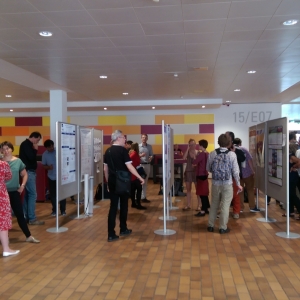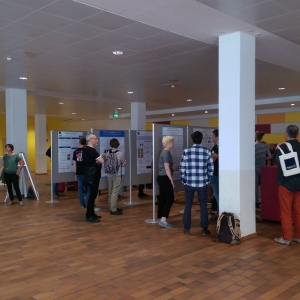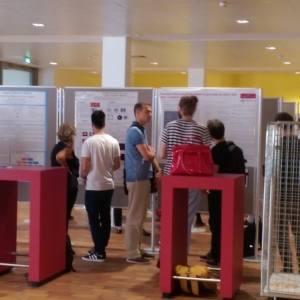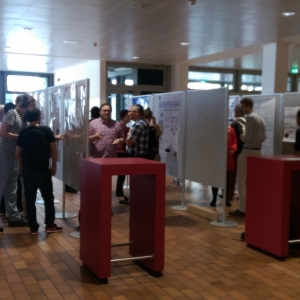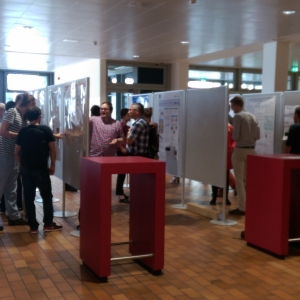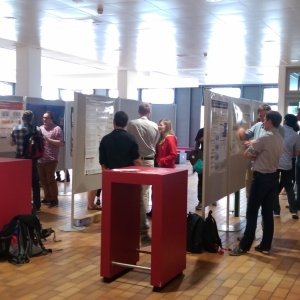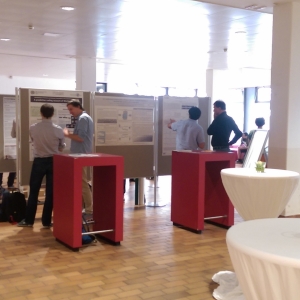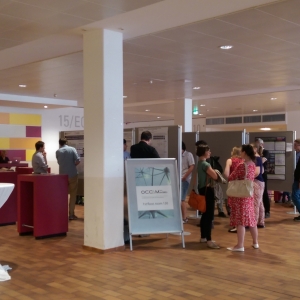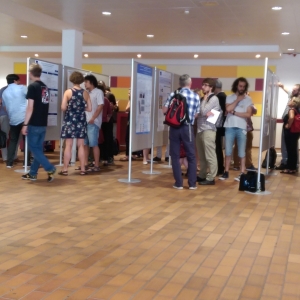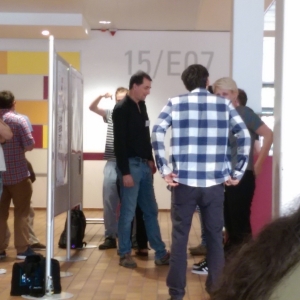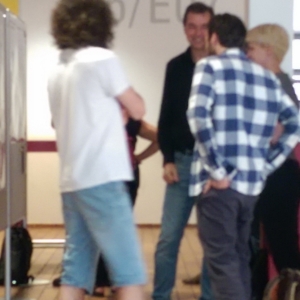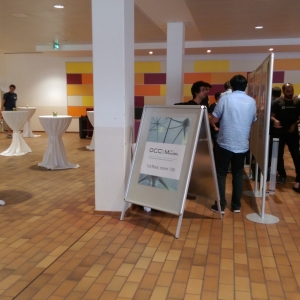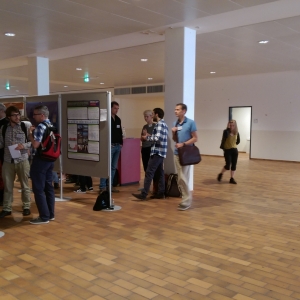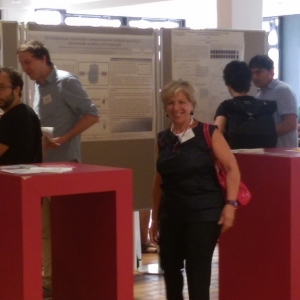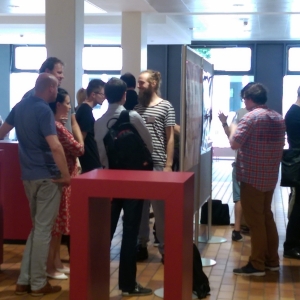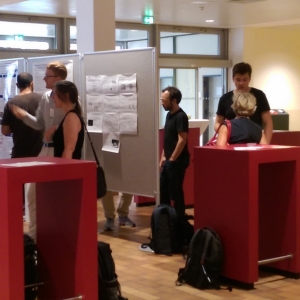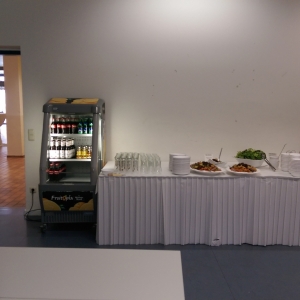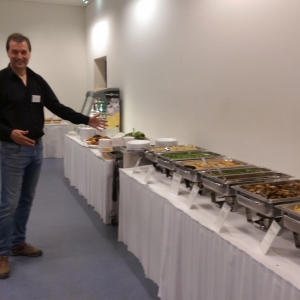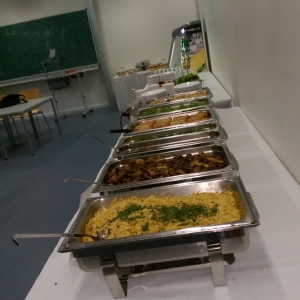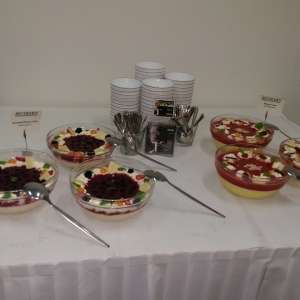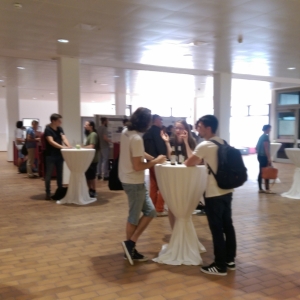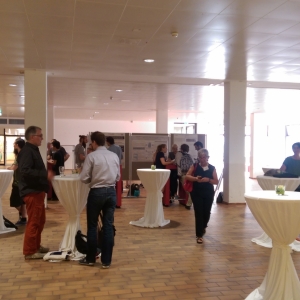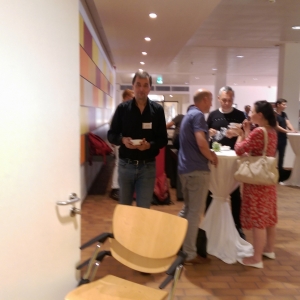Osnabrück Computational Cognition Alliance Meeting
and
socSMCs Workshop
on „Mechanisms and models of social interaction“
6 - 8 July 2017
Home
The goal of the OCCAM workshop series is to foster our understanding of mechanisms and principles of information processing in self-organized hierarchical and recurrent systems. Our knowledge of such systems is still very limited despite being a focus of research for many years. The OCCAM workshop series aims at assembling the latest results from various research branches in order to bring about a more comprehensive understanding of the principles of information processing with a particular focus on 3 major topics:
- Neural coding and representation of information in hierarchical systems
- Self-organisation in dynamic systems
- Mechanisms for probabilistic inference
The OCCAM workshop series is meant to shed light on the different aspects of such systems.
In 2017 OCCAM jointly with the socSMCs project will present the workshop on: „Mechanisms and models of social interaction“
This workshop is hosted by the Institute of Cognitive Science at the University of Osnabrueck.
We thank the following institutions for their generous financial support:
- socSMCs is a FET - Future Emerging Technologies H2020 project and has received funding from the European Union's Horizon 2020 research and innovation programme under grant agreement No 641321"
- F2IKW (submitted)
- Universitätsgesellschaft Osnabrück e.V. (submitted)



Contact
Scientific issues:
Organizing committee:
- Andreas K. Engel
- Frank Jäkel
- Peter König
- Gordon Pipa
Organizational issues:
Office:
Marion Schmitz
phone: +49(0)541 / 969-2407
fax: +49(0)541 / 969-2596
email: maschmit@uni-osnabrueck.de
Postal address:
University of Osnabrück
Institute of Cognitive Science
Research group "Neurobiopsychology"
Marion Schmitz (50/209)
Wachsbleiche 27
49069 Osnabrück
GERMANY
Program
| THURSDAY, 6 July 2017 | |
|---|---|
| 09:00 - 12:30 | Session I |
| Tamim Asfour Karlsruhe Institute of Technology |
|
| Verena V. Hafner Humboldt University of Berlin |
|
| Pascal Nieters University of Osnabrück (student presentation) |
|
| Ivan Herreros Alonso Universitat Pompeu Fabra, Barcelona |
|
| 12:30 - 14:00 | Lunch break |
| 14:00 - 17:00 | Session II |
| Maria Concetta Morrone University of Pisa |
|
| Bernhard Hommel Leiden University |
|
| Ivana Konvalinka Technical University of Denmark |
|
| 19:00 |
Öffentlicher Vortrag (public talk) in the Schloss (Auditorium): |
| Thomas Metzinger Tamim Asfour |
|
| Introduced by: Prof. Dr. sc. agr. Wolfgang Lücke President of the University of Osnabrück |
|
| Friday, 7 July 2017 | |
|---|---|
| 09:00 - 12:30 | Session III |
| Tobias Heed Bielefeld University |
|
| Basil Wahn University of Osnabrück |
|
| Poster preview | |
| Markus Siegel University of Tübingen |
|
| Susan E. Brennan Stony Brook University, Stony Brook (NY) (not yet confirmed) |
|
| 12:30 - 14:00 | Lunch break |
| 14:00 - 17:00 | Session IV |
| Simone Schütz-Bosbach Ludwig-Maximilians-Universität München |
|
| Ophelia Deroy Ludwig-Maximilians-Universität München |
|
| Luciano Fadiga University of Ferrara |
|
| 17:30 - 20:00 | Poster session |
| 18:00 | Buffet |
| SATURDAY, 8 July 2017 | |
|---|---|
| 09:00 - 12:30 | Session V |
| Thomas Metzinger Johannes Gutenberg University of Mainz |
|
| Anna Lisa Gert University of Osnabrück (student presentation) |
|
| Merle Fairhurst Ludwig-Maximilians-Universität München |
|
| Hauke Heekeren Free University Berlin |
|
| 12:30 - 14:00 | Farewell lunch |
Venue
Videos
If you have missed OCCAM 2017, here is the chance to watch and listen to the videos taken from most of the talks.
We hope they will call your interest to our OCCAM workshop series that will probably continue in 2019.
We are looking forward to welcoming you (again) in Osnabrück then.
Posters
Please find below the contributions to this year’s poster session.
We hope they will call your interest to our OCCAM workshop series that will probably continue in 2019.
We are looking forward to welcoming you (again) in Osnabrück then.
| Ahmed, Zurna: | Intracellular recordings and Hodgkin-Huxley model simulation of leech neurons |
| Czeszumski, Artur: | Does cooperative and competitive situations affect feedback processing differently? |
| Ehinger, Benedikt: | Filled-in percepts are judged as more reliable in perceptual decision making |
| Gschossmann, Lena: | Do audiovisual crossmodal correspondences facilitate learning to discriminate auditory pitch intervals? |
| Hernández García, Alejandro: | Predicting visual emotional perception through deep neural networks |
| Heuer, Falk: | New approaches in Go game AI with deep convolutional neural networks |
| Ibs, Inga: | Analysis of electronic medical records for clinical decision support |
| Khalid, Shah: | ERP investigations of influences in within- and across-categoy evaluative and non-evaluative semantic processing using words and faces |
| Lübbert, Annika: | Quantifying social interaction: can joint motor patterns be used as a marker of collaboration? |
| Maffei, Giovanni: | Anticipatory reflexes: reaction to sensory predictions or anticipatory motor commands? |
| Räuker, Max: | Decision-making in the joint loss experiment |
| Ramos Gameiro, Ricardo: | Visual behavior on natural static images in patients with Retinitis pigmentosa |
| Sanchez Fibla, Martí: | Adaptively learning levels of coordination form one’s other’s and task related errors |
| Schmidt, Timo: | Maintenance of sensory and abstract information in the somatosensory modality – a predictive coding account of working memory |
| Stoica, Mircea: | Similarity of behavior in task space promotes collaboration and joint performance |
| Strube, Andreas: | The neurophysiology of joint decision making |
Past occams
Please enjoy impressions (photos, videos) from our previous conferences:
Imprint
Herausgeber:
Institut für Kognitionswissenschaft
Wachsbleiche 27
49069 Osnabrück
www.cogsci.uos.de
Forschungsgruppe "Neurobiopsychologie":
Prof. Dr. Peter König
Telefon: (+49)541/969-2399
Telefax: (+49)541/969-2596
E-Mail: pkoenig@uos.de
Web-Team:
Institut für Kognitionswissenschaft, Forschungsgruppe Neurobiopsychologie
E-Mail: Webmaster
Gestaltung und technische Realisierung:

G&S IT Solutions GmbH
Tannenhof 1
49191 Belm
info@gsits.de
www.gs-it-solutions.de
Bildrechte:
iStockphoto (Calgary, Alberta T2G 1M8, Canada): "Neurons"
Disclaimer
Das Institut für Kognitionswissenschaft in Osnabrück hat alle in seinem Bereich bereit gestellten Informationen nach bestem Wissen und Gewissen erarbeitet und geprüft. Es wird jedoch keine Gewähr für die Aktualität, Richtigkeit, Vollständigkeit oder Qualität und jederzeitige Verfügbarkeit der bereit gestellten Informationen übernommen.
Das Institut für Kognitionswissenschaft in Osnabrück behält es sich ausdrücklich vor, einzelne Webseiten oder das gesamte Angebot ohne gesonderte Ankündigung zu verändern, zu ergänzen, zu löschen oder die Veröffentlichung zeitweise oder endgültig einzustellen.
Haftung
Haftung im Sinne § 8 TDG
Das Institut für Kognitionswissenschaft in Osnabrück stellt sein Internetangebot unter folgenden Nutzungsbedingungen zur Verfügung:
1. Das Institut für Kognitionswissenschaft in Osnabrück ist als Diensteanbieter nach § 8 Abs. 1 TDG für die eigenen Inhalte, die es zur Nutzung bereit hält, nach den allgemeinen Vorschriften verantwortlich. Die Haftung für Schäden materieller oder ideeller Art, die durch die Nutzung der Inhalte verursacht wurden, ist ausgeschlossen, sofern nicht Vorsatz oder grobe Fahrlässigkeit vorliegt.
2. Soweit ein Text von dritter Seite erstellt ist, wird der jeweilige Verfasser namentlich benannt. In diesen Fällen ist der Verfasser des jeweiligen Dokuments bzw. sein Auftraggeber für den Inhalt verantwortlich.
Haftungsausschluß im Sinne § 9 TDG
Das Institut für Kognitionswissenschaft in Osnabrück macht sich den Inhalt der innerhalb seines Angebots per Hyperlinks zugänglich gemachten fremden Websites ausdrücklich nicht zu eigen und kann deshalb für deren inhaltliche Korrektheit, Vollständigkeit und Verfügbarkeit keine Gewähr leisten. Das Institut für Kognitionswissenschaft in Osnabrück hat keinen Einfluss auf die aktuelle und zukünftige Gestaltung und auf Inhalte der gelinkten Seiten.
Urheberrecht und Kennzeichenrecht
Die Urheberrechte dieser Web-Site liegen vollständig beim Institut für Kognitionswissenschaft in Osnabrück.
Der Autor ist bestrebt, in allen Publikationen die Urheberrechte der verwendeten Grafiken, Tondokumente, Video-Sequenzen und Texte zu beachten, von ihm selbst erstellte Grafiken, Tondokumente, Video-Sequenzen und Texte zu nutzen oder auf lizenzfreie Grafiken, Tondokumente, Video-Sequenzen und Texte zurückzugreifen.
Alle innerhalb des Internet-Angebotes genannten und gegebenenfalls durch Dritte geschützten Marken- und Warenzeichen unterliegen uneingeschränkt den Bestimmungen des jeweils gültigen Kennzeichenrechts und den Besitzrechten der jeweiligen eingetragenen Eigentümer.
Allein aufgrund der bloßen Nennung ist nicht der Schluß zu ziehen, daß Markenzeichen nicht durch Rechte Dritter geschützt sind.
Das Copyright für veröffentlichte, vom Autor selbst erstellte Objekte bleibt allein beim Autor der Seiten.
Eine Vervielfältigung oder Verwendung solcher Grafiken, Tondokumente, Video-Sequenzen und Texte in anderen elektronischen oder gedruckten Publikationen ist ohne ausdrückliche Zustimmung des Autors nicht gestattet, wenn es den zulässigen Umfang überschreitet oder den zulässigen Zweck nicht erfüllt.

